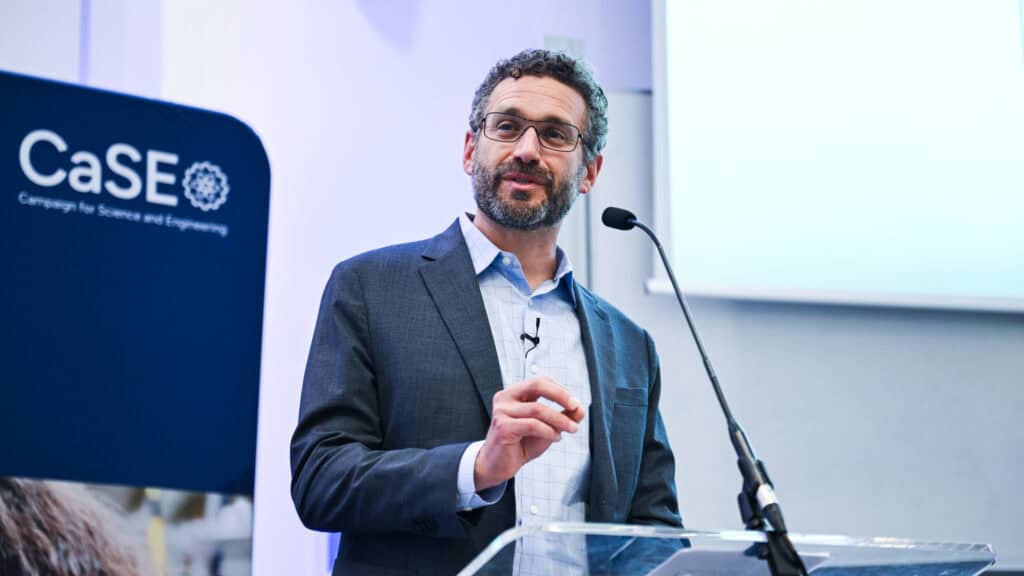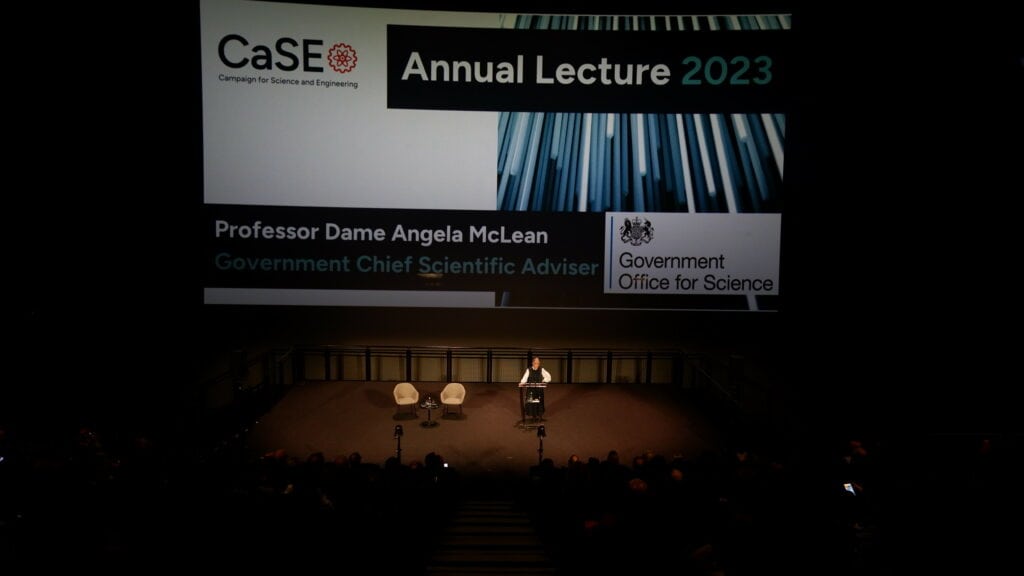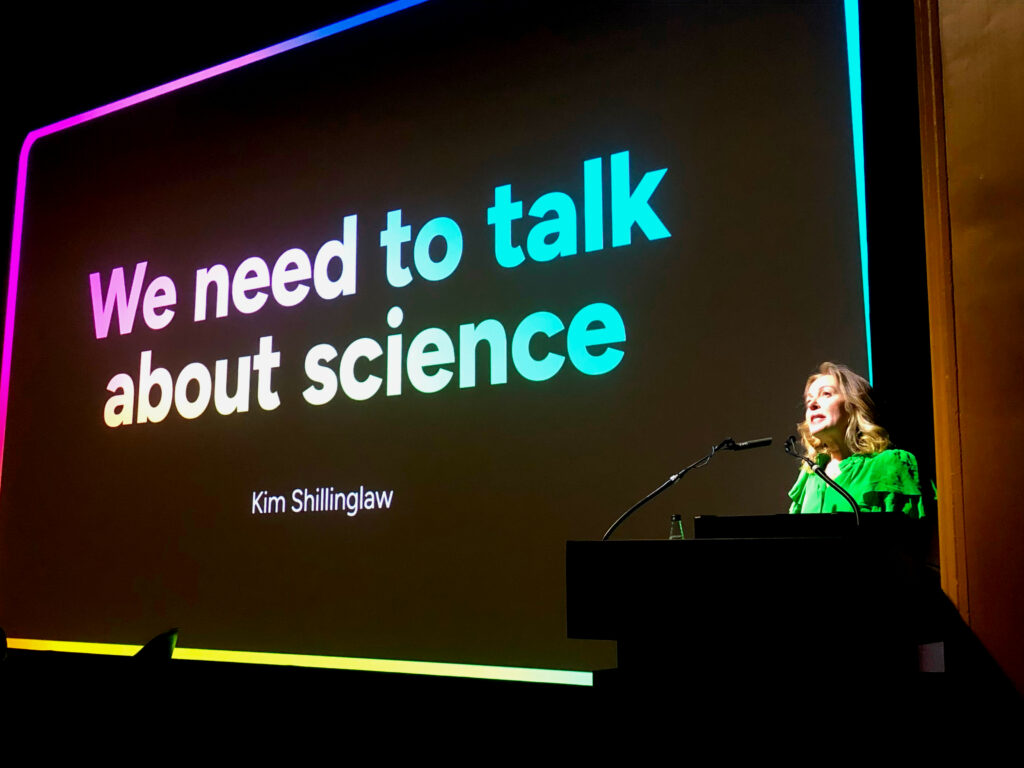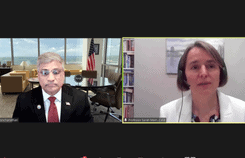Over 500 people from across the science and engineering community watched Professor Leyser’s lecture live, setting out her thoughts on the future direction of the relationship between science and society and the role UKRI can play in this. CaSE Policy Officer James Tooze offers a summary of the event.
CaSE Annual Lecture 2020 with the Chief Executive of UKRI
11 Nov 2020
We were delighted to host Professor Dame Ottoline Leyser, Chief Executive of UKRI to give this year’s Annual Lecture.
CaSE Chair, Graeme Reid, opened with comments about how CaSE has been running Annual Lectures for over 30 years, with this not only being the first online lecture but also the most well attended lecture. He gave thanks to our sponsor, Elsevier, for their kind support for this year’s lecture. Chief Executive of Elsevier, Kumsal Bayazit, reflected on the changes to the science and engineering sector since our last lecture with Sir Patrick Vallance in January, with science being responsible for so much of the response to the pandemic.
Dame Ottoline started by reflecting on the need for organisations that have to work to raise the profile of research and innovation in the UK, when science is a force of good for everyone across the country in improving and helping lives. She noted that on some level, everyone interacts with science and engineering every day, for example children who are keen to investigate and explore the world around them. With this being the case, Ottoline posed the question of why then is science and engineering often seen like a separate world that many people do not feel connected to?
Ottoline reflected upon the fact science and engineering often feels compartmentalised, including those who work in science and engineering. This is a major challenge in inspiring people to become part of the science and engineering workforce, particularly as it narrows the types of people who might become a scientist which means the sector misses out on a diverse range of people that fuel greater creativity. The segregation of science and engineering also disconnects research from seeming like it is working to meet societal needs, therefore is not appreciated for the value that it brings to society. A research and innovation system that is well embedded into society can help to breed optimism that science and engineering can address some of the key challenges facing people.
The formation of UKRI was recommended by the Nurse Review, which also stated the need for a compact between science and society, yielding excellent science that can be used for public good. Ottoline believes that UKRI can champion this endeavour and address some of the challenges she outlined.
Ottoline continued by talking about the way in which research and innovation can be better articulated. Traditionally, research and innovation was thought of as a linear process, where investments can either yield discoveries or product development. In practice, this process is far more complex and the current methods of measuring success often do not reflect the importance of the interconnectedness of the research system required for success. Ottoline said that more needed to be done to support the entire range of activities within the research ecosystem, including understanding market pull for products, the impact of the research for public benefit, and perhaps most importantly the movement of people and ideas across all parts of the sector.
Ottoline linked this back to her first remarks, that a poor conception of what a researcher looks like and does means that the entire research ecosystem is not appreciated as it should be. In reality, a huge network of people in a number of roles support researchers who are just as important to the scientific endeavour. Being able to appreciate and support the diversity of these roles is also a way to make a larger number of people feel like they are part of science and engineering. It is important to highlight the ways in which people can get involved in science and engineering in schools, and also bring those who have had a break in their career back in to the workforce.
A key feature of a thriving research and innovation sector is the development and movement of ideas. This comes down to individuals moving between different types of organisations and this movement should be encouraged. Ottoline felt that there has been underinvestment in connectivity and schemes that encourage people to move, collaborate and act as knowledge brokers. As it is more difficult to measure the effects of these types of activities when compared to other types of research, it is important that they are not undervalued.
Ottoline said that the R&D roadmap has made positive steps in identifying how research and innovation can be supported and driven. She believes that UKRI can act as the steward of a research and innovation system that is for the benefit of the public and everyone who contributes. To do this, UKRI must continue to invest in a diverse portfolio that supports all of those who contribute to research and innovation, including championing the careers of all of those involved. Ottoline believes that UKRI has the chance to do this and capture the benefits of making people feel more involved in research and innovation and bring positive agency for science and engineering in the UK.
Ottoline noted that through the Covid-19 pandemic, science has received a high-profile in the public eye. The scientific response has been key to tackling the virus, but data and scientific evidence has also featured heavily in the news, press conferences, giving the public an authentic representation of the importance of science and research. The response has also shown that science has a role in providing the tools to navigate some of the greatest challenges facing society, but must be accompanied by public debate and political decision making. In concluding her remarks, Ottoline said that we have the opportunity to build a research and innovation system that links science and society, as wished for by the Nurse Review, giving everyone the chance to feel part of science and bring benefits to society.
A question and answer session followed with CaSE Executive Dr Sarah Main, with the first question relating to UKRI’s potential role in working by itself or with partners to build a public engagement capability. Ottoline said that UKRI was working with partners to support public engagement and spoke of the value of one-on-one interactions between the research community and the wider public. Ottoline was then asked about how the research sector can better celebrate the breadth of careers she spoke about during her talk and move away from a ‘hero’ model, and she responded by saying that UKRI was thinking very seriously about how to champion and celebrate all those who contributed to scientific discoveries and breakthroughs.
Questions then ranged from how UKRI can support business and international collaborations, along with its own investment in research. Ottoline said that the formation of UKRI has made it much easier to support cross-cutting endeavours of multidisciplinary research and business collaborations. She said that UKRI are committed to increase budgets for their constituent councils as well as seeking to gain more autonomy from central UK Government. She also said that UKRI was committed to ensuring UK scientists can continue to collaborate with anyone they would like to across the world.
When asked if she had one hope for the future, Ottoline said that it would be that people could be stopped on the street and would be supportive of research and innovation and understand the benefits of research for their life in the present and the future. Graeme Reid closed proceedings by thanking Ottoline for her talk and her vision for UK research and innovation.
Our thanks again to Elsevier for sponsoring the event. Readers might be interested in their recent report on the UK Research landscape that can be accessed here.
Related resources

CaSE’s 2024 Annual Lecture was given by Ilan Gur, CEO of the Advanced Research and Invention Agency (ARIA) on December 12th.

The 2023 CaSE Annual Lecture was given by Prof Dame Angela McLean.

CaSE’s 2022 Annual Lecture, given by Kim Shillinglaw, explored how the UK can forge a deeper and broader public connection with research and innovation.

Read our write-up from the CaSE Annual Lecture 2021 given by the Director of the National Science Foundation, Dr Sethuraman Panchanathan.